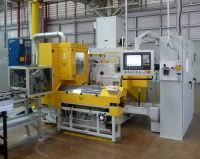Allison Transmission Purchases Cell from C & B Machinery

Allison Transmission, which manufactures commercial-duty automatic transmissions and hybrid propulsion systems for truck and off-road vehicle manufacturers, has ordered another new grinding cell from C & B Machinery. After multiple machine orders for a plant in Chennai, India they are bringing this same technology to the US. C & B Machinery develops and builds grinding systems for manufacturers around the world; in this case, it will build a "flexible" double-disc grinding cell for Allison Transmission in Indianapolis, Indiana.
The new cell is designed to grind the faces of transmission pinion gears for Allison's 3000 series transmissions. This machine will be set up to grind three different pinion configurations, flexible for future expansion and any future part program changes. The grinding cycle time for a finished part will be 15 seconds.
Double disc grinders remove an equal amount of material from both faces, simultaneously. The new machine performs a "rotary plunge" grinding cycle, which means the pinions are introduced to the grinding wheels via a rotary carrier, one at a time, while the grinding wheels plunge grind simultaneously through axis interpolation. There are several advantages for grinding in this manner, the most important of which is the grinding wheels are adjusted perfectly parallel and concentric to each other. Most often, conventional double-disc grinding requires compound head settings. Keeping the wheels parallel results in a more uniform wheel wear and it reduces the frequency of dress cycles required. The cost per piece is reduced and the return on investment is faster.
This grinding cycle was developed by C & B Machinery engineers. In addition to the operating and investment cost savings it allows 100 percent gauge feedback on every component ground. Size control is tightened, resulting in higher statistical capability. For example, the grinding cells previously shipped by C & B far exceeded 2.0 ppk in overall height (± 0.030 mm) and parallelism (0.026 mm).





